Related Research Articles
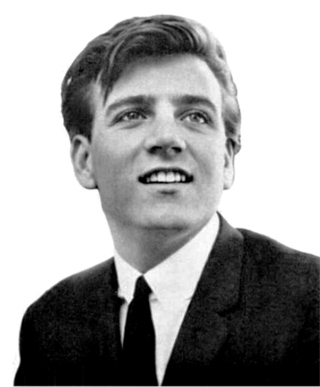
William Howard Ashton, known professionally as Billy J. Kramer, is an English pop singer. With The Dakotas, Kramer was managed by Brian Epstein during the 1960s and scored hits with several Lennon–McCartney compositions never recorded by the Beatles, among them the UK number one "Bad to Me" (1963). Kramer and the Dakotas had a further UK chart-topper in 1964 with "Little Children" and achieved U.S. success as part of the British Invasion. Since the end of the beat boom, Kramer has continued to record and perform. His autobiography, Do You Want to Know a Secret, was published in 2016.

"From Me to You" is a song by the English rock band the Beatles that was released in April 1963 as their third single. It was written by John Lennon and Paul McCartney. The song was the Beatles' first number 1 hit on what became the official UK singles chart but the second, after "Please Please Me", on most of the other singles charts published in the UK at the time. "From Me to You" failed to make an impact in the United States at the time of its initial release. Instead, a 1963 cover version released by Del Shannon resulted in the song's becoming the first Lennon–McCartney track to enter the US pop charts. The Beatles' original was re-released in the US in January 1964 as the B-side to "Please Please Me", and reached number 41.
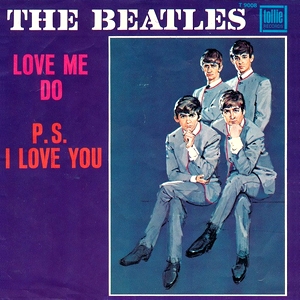
"Love Me Do" is the debut single by the English rock band the Beatles, backed by "P.S. I Love You". When the single was originally released in the United Kingdom on 5 October 1962, it peaked at number 17. It was released in the United States in 1964 and topped the nation's song chart. Re-released in 1982 as part of EMI's Beatles 20th anniversary, it re-entered the UK charts and peaked at number 4. "Love Me Do" also topped the charts in Australia and New Zealand.
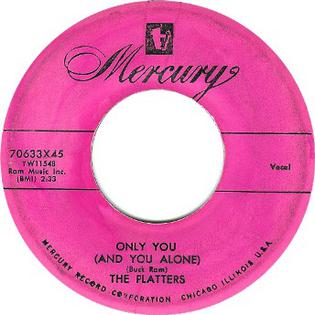
"Only You (And You Alone)" (often shortened to "Only You") is a pop song composed by Buck Ram. It was originally recorded by The Platters with lead vocals by Tony Williams in 1955.

"Little Things Mean a Lot" is a popular song, with lyrics by Edith Lindeman and music by Carl Stutz, published in 1953. Lindeman was the leisure editor of the Richmond Times-Dispatch, and Stutz, a disc jockey from Richmond, Virginia. Stutz and Lindeman are also known for writing Perry Como's 1959 hit, "I Know".

"I Feel Fine" is a song by the English rock band the Beatles that was released in November 1964 as the A-side of their eighth single. It was written by John Lennon and credited to the Lennon–McCartney partnership. The recording includes one of the earliest uses of guitar feedback in popular music.
"Kewpie Doll" is a 1958 popular song, written by Sid Tepper and Roy C. Bennett. It is based on the popular Kewpie comics characters by Rose O'Neill, who inspired a merchandising phenomenon of dolls and other toys.
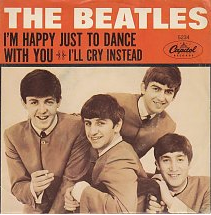
"I'm Happy Just to Dance with You" is a song written by John Lennon and Paul McCartney and recorded in 1964 by the English rock band the Beatles for the film soundtrack to A Hard Day's Night. Lead vocals are by George Harrison, whose performance in the film marked the first mass media depiction of Harrison singing lead.
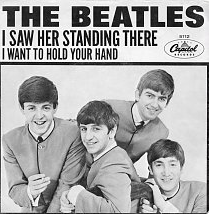
"I Saw Her Standing There" is a song by the English rock band the Beatles, written by Paul McCartney and John Lennon. It is the opening track on the band's 1963 debut UK album Please Please Me and their debut US album Introducing... The Beatles.
"Do You Want to Know a Secret" is a song by English rock band the Beatles from their 1963 album Please Please Me, sung by George Harrison. In the United States, it was the first top ten song to feature Harrison as a lead singer, reaching No. 2 on the Billboard chart in 1964 as a single released by Vee-Jay, VJ 587. In the UK, Billy J. Kramer released a cover of the song as his debut single, reaching No. 1 on the NME singles chart and No. 2 on the Record Retailer chart.
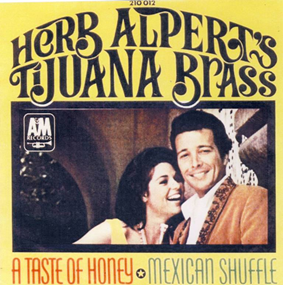
"A Taste of Honey" is a pop standard written by Bobby Scott and Ric Marlow. It was originally an instrumental track written for the 1960 Broadway version of the 1958 British play A Taste of Honey which was also made into the film of the same name in 1961. The original and a later recording by Herb Alpert in 1965 earned the song four Grammy Awards.

"Stars on 45" is a song medley issued in January 1981 by Dutch studio group Stars on 45. In some countries, including the UK, Ireland, and New Zealand, the band was credited as 'Starsound' and only the medley itself was named "Stars on 45".

"A World Without Love" is a song recorded by the British duo Peter and Gordon and released as their first single in February 1964. It was included on the duo's debut album in the UK, and in the US on an album of the same name. The song was written by Paul McCartney and attributed to Lennon–McCartney. The B-side was "If I Were You", written by Peter and Gordon.

"Bad to Me" is a song credited to Lennon–McCartney. In late interviews, John Lennon said that he wrote it for Billy J. Kramer with The Dakotas while on holiday in Spain. However, in a 1964 interview he said that he and Paul McCartney wrote it in the back of a van, declaring McCartney a contributor. Lennon's original demo of the song was released on iTunes in December 2013 on the album The Beatles Bootleg Recordings 1963. It became one of the first occasions a Lennon–McCartney composition made the US Top 40 recorded by an artist other than the Beatles.
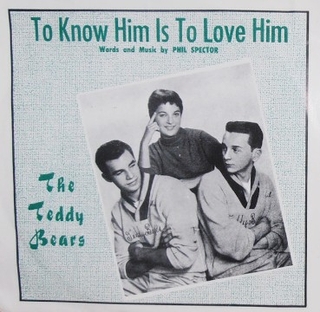
"To Know Him Is to Love Him" is a song written by Phil Spector, inspired by the words on his father's gravestone, "To Know Him Was to Love Him". It was first recorded by the only vocal group of which he was a member, The Teddy Bears. The single spent three weeks at No. 1 on the Billboard Hot 100 chart in 1958, while reaching No. 2 on the UK's New Musical Express chart. Peter & Gordon and Bobby Vinton later each experienced chart success with the song, in 1965 and 1968, respectively.
Nobody I Know is a song written by Paul McCartney which Peter and Gordon recorded in an April 1964 session at Abbey Road Studio. Peter and Gordon had had a UK and US #1 hit with the McCartney composition "A World Without Love" and McCartney wrote "Nobody I Know" with the specific intent of providing a follow-up hit for the duo. Billboard described the song as a "strong follow-up" to "A World Without Love." Cash Box described it as "a captivating uptempo romancer...that the twosome wraps up with loads of charm."
"I Will" is a song written by Dick Glasser.
"I'll Keep You Satisfied" is a song written primarily by Paul McCartney and credited to the Lennon-McCartney partnership. It was released as a single by Billy J. Kramer with the Dakotas on 1 November 1963, and released on Kramer's album Little Children. It reached number 4 and spent 13 weeks in the UK charts, kept off the top spot by the Beatles' "She Loves You" and "You'll Never Walk Alone". The song hit #30 in the US charts in 1964.
"From a Window" is a song written by Paul McCartney, attributed to John Lennon and Paul McCartney, which was recorded by Billy J. Kramer with The Dakotas. It was the last of six Lennon–McCartney compositions recorded by Kramer.
"The Door Is Still Open to My Heart" is a 1955 song written by Chuck Willis and originally performed by the Baltimore-based R&B vocal group, The Cardinals. In the US, the original version peaked at number four on the R&B playlist and number ten in R&B sales charts. Later in 1955, Don Cornell recorded the song and released it as the B-side to his hit, "Most of All". The Hilltoppers had a moderate hit with this song the same year.
References
- 1 2 3 4 5 Rice, Jo (1982). The Guinness Book of 500 Number One Hits (1st ed.). Enfield, Middlesex: Guinness Superlatives Ltd. p. 77. ISBN 0-85112-250-7.
- ↑ "Little Children: Song review". Allmusic.com. Retrieved 2007-12-01.
- ↑ Whitburn, Joel (2004). The Billboard Book of Top 40 Hits: Eighth Edition. Record Research. p. 353.
- ↑ "CHUM Hit Parade - May 11, 1964".
- ↑ "CHUM Hit Parade - June 8, 1965".
- ↑ "RPM Top 40-5s - June 29, 1965" (PDF).